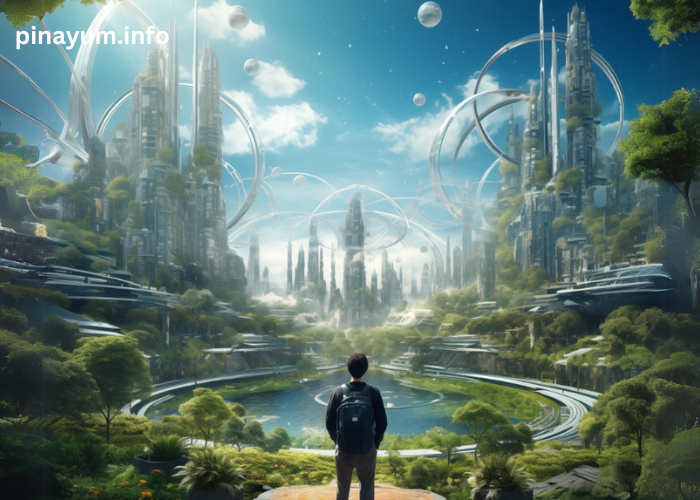In the 21st century, technology has become the cornerstone of modern life. From the smartphones in our pockets to the artificial intelligence algorithms that power business decisions, tech innovations are reshaping how we live, work, and interact with the world. The future of technology promises even greater transformations, as we enter an era where digital advancements blur the lines between the physical and virtual worlds. As we look toward the horizon, several key trends are poised to define the future of tech and have profound implications for society. This article explores these trends and their potential impact on the world.
1. Artificial Intelligence (AI) and Automation: Redefining Work and Human Potential
One of the most talked-about technologies is artificial intelligence (AI). AI refers to the creation of machines that can perform tasks that traditionally require human intelligence. This includes learning, problem-solving, decision-making, and even creativity. While AI has been in development for decades, recent advancements in machine learning, deep learning, and natural language processing are enabling AI systems to become increasingly powerful.
Automation and the Workforce
Automation, powered by AI, is transforming industries ranging from manufacturing to healthcare. Robots and machines are taking over repetitive, mundane tasks that once required human labor, such as assembling products on factory lines or scheduling meetings. In the future, AI-driven automation will expand to more complex roles, including medical diagnoses, legal research, and even creative industries like art and music production.
While automation has the potential to increase productivity and efficiency, it also raises concerns about job displacement. Millions of workers in sectors like retail, transport, and customer service are at risk of losing their jobs to AI-powered systems. However, there is hope that automation will create new jobs that focus on managing, maintaining, and developing AI technologies.
The Future of Human-AI Collaboration
Rather than replacing humans entirely, the future of AI is likely to be one of collaboration. In fields such as healthcare, AI can assist doctors in diagnosing diseases by analyzing large amounts of data quickly and accurately, but human judgment will still play a crucial role. In creative fields, AI can generate ideas or assist with tasks, but human creativity, emotion, and insight will continue to be central to producing unique, original works.
AI will continue to evolve, and as it does, it will empower humans to focus on higher-order tasks that require emotional intelligence, critical thinking, and complex problem-solving. The future of work will be one where humans and machines collaborate, complementing each other’s strengths.
2. The Rise of Quantum Computing: A New Era of Computing Power
Quantum computing is a rapidly emerging field that promises to revolutionize computing by harnessing the principles of quantum mechanics. Unlike traditional computers, which process information as binary bits (0s and 1s), quantum computers use quantum bits, or qubits, which can exist in multiple states simultaneously.
Quantum Leap in Processing Power
This quantum phenomenon allows quantum computers to solve problems exponentially faster than classical computers. For example, quantum computers could solve complex problems in minutes that would take traditional computers years to solve. This has massive implications for fields like cryptography, material science, drug discovery, and optimization problems.
Implications for Society
Quantum computing will drive innovation across a variety of sectors. In healthcare, for instance, quantum computers could accelerate the discovery of new drugs by simulating molecular interactions at an unprecedented level of detail. In cybersecurity, quantum encryption could provide an unbreakable shield against hacking, as quantum systems are capable of creating cryptographic keys that are far more secure than current ones.
However, the rise of quantum computing also presents challenges. The development of quantum technology could disrupt existing cryptographic systems, forcing governments, businesses, and individuals to adopt new security protocols. Moreover, the power of quantum computing could also be weaponized if it falls into the wrong hands.
3. The Metaverse: A Virtual World Intertwining with Reality
The concept of the metaverse has garnered significant attention in recent years. A metaverse is a virtual, immersive, and interconnected digital universe where people can interact with each other and digital objects through avatars. This idea is inspired by science fiction, notably the 1992 novel Snow Crash by Neal Stephenson and Ready Player One by Ernest Cline.
Virtual Reality and Augmented Reality Convergence
The metaverse will be powered by virtual reality (VR) and augmented reality (AR). VR immerses users in a completely digital environment, while AR overlays digital content onto the real world. As these technologies improve, the metaverse will provide experiences that are increasingly realistic and interactive, allowing users to attend virtual meetings, socialize, play games, work, and shop—all from the comfort of their homes.
For industries like gaming, entertainment, and education, the metaverse offers exciting new opportunities. Imagine playing a video game where the boundaries between the real world and the game world are blurred, or attending a classroom where you can physically interact with 3D models and simulations. The potential for the metaverse to transform education, remote work, and social interactions is immense.
Economic and Social Impact
As the metaverse evolves, it could also lead to the creation of entirely new economies. Virtual real estate, digital goods, and services could become a booming industry, with people investing in virtual assets, buying digital fashion, and even working as virtual real estate agents or designers. Companies like Facebook (now Meta) and Microsoft are already heavily investing in the development of the metaverse, betting on its potential to reshape how people live and work.
However, the metaverse also raises questions about privacy, data security, and the potential for addiction. The blurring of digital and physical boundaries could also lead to new forms of social isolation, as people spend more time in virtual worlds at the expense of real-world relationships.
4. 5G and Beyond: The Next Generation of Connectivity
Connectivity is the backbone of the modern digital world. The advent of 5G technology represents a massive leap forward in wireless communication, enabling faster internet speeds, lower latency, and the capacity to connect more devices simultaneously.
The Internet of Things (IoT) and Smart Cities
5G will play a crucial role in the expansion of the Internet of Things (IoT), a network of connected devices that can communicate with each other. This includes everything from smart home devices like thermostats and security cameras to connected cars and wearable health monitors. With 5G’s low latency and high bandwidth, these devices will operate more efficiently and in real time, creating smarter cities and ecosystems.
In smart cities, for example, 5G networks will support connected traffic lights, autonomous vehicles, and real-time data analytics to improve urban planning and resource management. Public services such as healthcare, transportation, and energy grids will also become more efficient, responsive, and accessible.
Challenges and Opportunities
The deployment of 5G networks worldwide will require significant investment in infrastructure, and many countries face challenges in rolling out 5G coverage. There are also concerns about the potential health effects of increased electromagnetic radiation exposure from 5G towers, though studies have so far not provided conclusive evidence of harm.
Despite these challenges, 5G will open up new possibilities for industries like healthcare, education, and entertainment. For instance, telemedicine could become more widespread, allowing doctors to perform remote surgeries using robotic systems controlled over 5G networks.
5. Sustainability and Green Technology: Tech’s Role in Combatting Climate Change
As the world faces the growing threat of climate change, technology is increasingly seen as a solution to mitigate environmental impact. From renewable energy innovations to sustainable farming practices, the future of tech is closely intertwined with sustainability.
Clean Energy and Green Tech Innovations
The development of clean energy technologies such as solar power, wind energy, and nuclear fusion will play a pivotal role in reducing global dependence on fossil fuels. Advances in energy storage, such as more efficient batteries, will enable renewable energy sources to become more reliable and widespread.
Additionally, tech innovations in fields like electric vehicles (EVs), smart grids, and carbon capture and storage (CCS) technologies will help reduce emissions and build a more sustainable future. AI will also be leveraged to optimize energy consumption, improving everything from home heating systems to industrial processes.
Tech for Environmental Conservation
Tech is also making a significant impact on environmental conservation. Drones and satellite imaging are being used to monitor forests, oceans, and wildlife populations, helping researchers track environmental changes in real time. AI-driven analytics are being applied to predict climate trends, manage water resources, and reduce food waste.
Conclusion: Embracing the Future of Tech
As we look ahead, it is clear that technology will continue to transform every aspect of society. AI and automation will redefine work and human potential, while quantum computing will drive breakthroughs in science and security. The metaverse will provide immersive digital experiences, and 5G will pave the way for smarter, more connected worlds. At the same time, sustainability efforts will ensure that technology works to preserve the planet for future generations.
However, these advancements also come with challenges—job displacement, privacy concerns, and environmental impact—requiring thoughtful regulation and ethical consideration. The future of tech is not only about innovation but also about finding ways to ensure these technologies are developed and implemented responsibly.
By embracing these trends and harnessing the power of technology in a positive way, we can build a future where tech serves humanity, empowering individuals, industries, and societies to thrive in an increasingly interconnected world. The future of tech is exciting, and we stand at the threshold of a new era, one where the possibilities are limitless.





